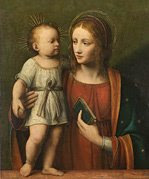
I recently received the following email from a reader:
Hi, I bought your book, The Catholic Homeschool Companion, at a homeschool conference. My question is about the article titled “Using Saxon Math Effectively” found on pages 17-26. In your article, you refer readers to many math literature books. Trusting a fellow Catholic, I just assumed the referenced books would be of Catholic standards or at least with nothing contrary to our faith in them. So it was with great shock and disappointment that when I requested the book, “The Man Who Counted: A Collection of Mathematical Adventures” by Malba Tahan from our local library and found such non-Catholic material on the very first page in the very first sentence. The first sentence of this book states and I quote, “In the name of Allah, the All-Merciful!” This is not Catholic nor is it something that I would expect to find any Catholic writer to refer readers to be helpful in their homeschooling. And it certainly isn’t something I want to read to my children and instill in their minds. I was just wondering what your reasoning was for including this particular book as acceptable material and will I find any more books referred to throughout your book that are unacceptable to the Catholic faith?
I responded privately to the writer, but I would also like to address this publicly as I assume that others will have similar concerns.
First, I respect the writer's opinion and I appreciate that she wrote to me to get my side of the story. I do think she makes a very good point. I disagree that
The Man Who Counted is contrary to our faith, but I should have been more clear in the book's description about the references to Allah and Islam and I should have given a stronger warning.
Note that I also recommend
The Man Who Counted in
For the Love of Literature and it remains one of my very favorite pieces of math literature.
I first discovered
The Man Who Counted on
MacBeth Derham's website. MacBeth is a wonderfully dedicated Catholic homeschooler. I've also seen the book reviewed positively on a host of Catholic homeschooling blogs and websites, as well as
Heart and Mind Magazine.
Being a math geek, I fell in love with it. The number puzzles presented in real life situations is a great way to get kids excited about math. Even the non math geeks will love it! So much better than dry textbooks.
Mathematics, by its very nature as a universal language, is a discipline that has benefited from the insights of many cultures, especially the Arabic cultures. While we should not promote other faiths, we can surely take the good work of people from other faiths. We can find the good, the true, and the beautiful. Have we not done that with math all along? Our very numbers are Arabic; Roman numerals are terribly cumbersome. Then there are all of the advanced mathematical endeavors they pursued. Algebra is an Arabic word. We've even been able to learn from the Mayans in the area of mathematics.
The Man Who Counted is a book about numbers. That a Muslim recognizes the beauty of mathematics is not antithetical to our faith, but a testament to God who created the universe. All men of intellect see the beauty of His creation in mathematics, whether they recognize Him or not.
Interestingly enough, the author of
The Man Who Counted is a good Catholic man from Brazil. In the original book (written in Portuguese) the last chapter tells of the protagonist finding Christian Truth. This was left out of the English (British) version, which is no less than a mortal sin in the profession of scholarly translation as well as a mortal sin period imo.
Also interesting is the fact that Arab speaking Christians refer to God as Allah.
These are all things I point out to my children when reading
The Man Who Counted. I see this book as historical fiction as well as a math book. And then there is the whole apologetics angle -- teaching about Islam and Christian Truth.
As homeschoolers, all subjects can be interdisciplinary. There is not line between "math time" and "social studies time."
The opening phrase can be skipped. I sometimes use the black marker method and black out offensive phrases. This is why I recommend parents pre-reading their children's books. Even good orthodox Catholics can disagree on what makes a good book.
One final note, it would be impossible to give my children a solid education if I only used books by Catholics, completely free of error. It would mean leaving out Dickens and Lewis. It would mean skipping Ancient Rome and Ancient Greece. The important thing to me is to present these books to my children baptized in the Catholic Faith -- giving them Church teaching on issues that come up as we read. Issues they will be faced with when they go out into the real world.



















 Stumble It!
Stumble It!